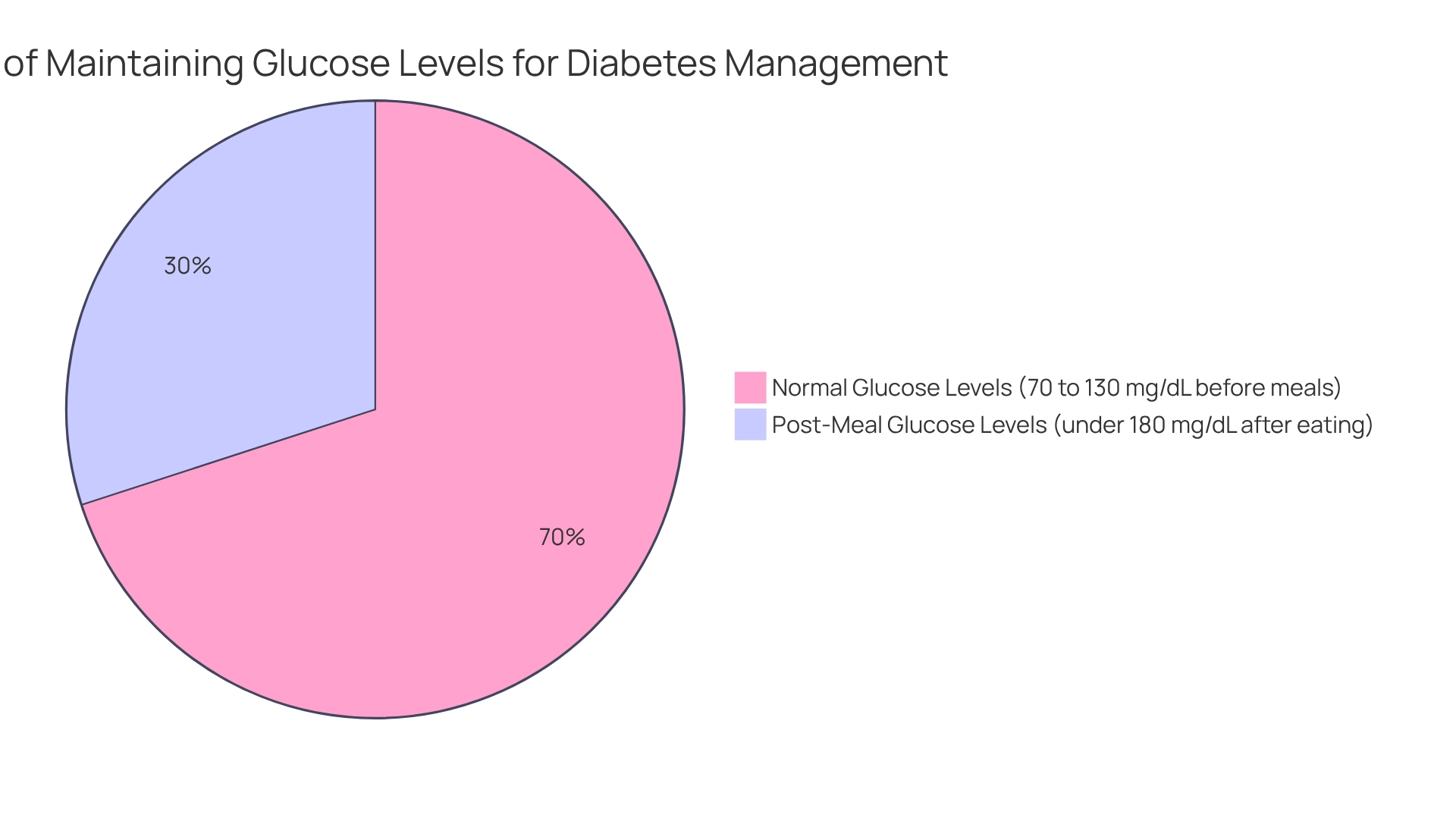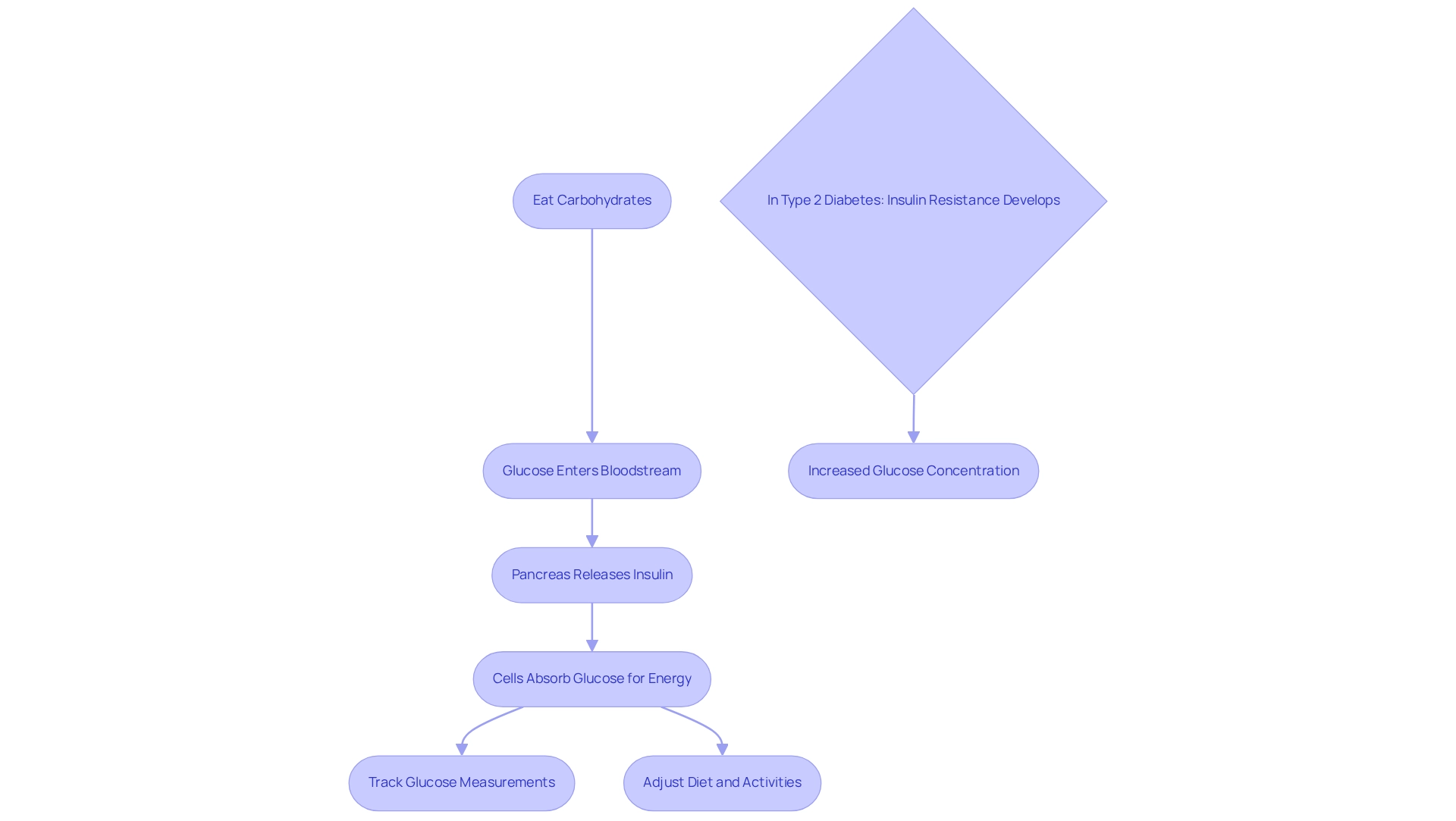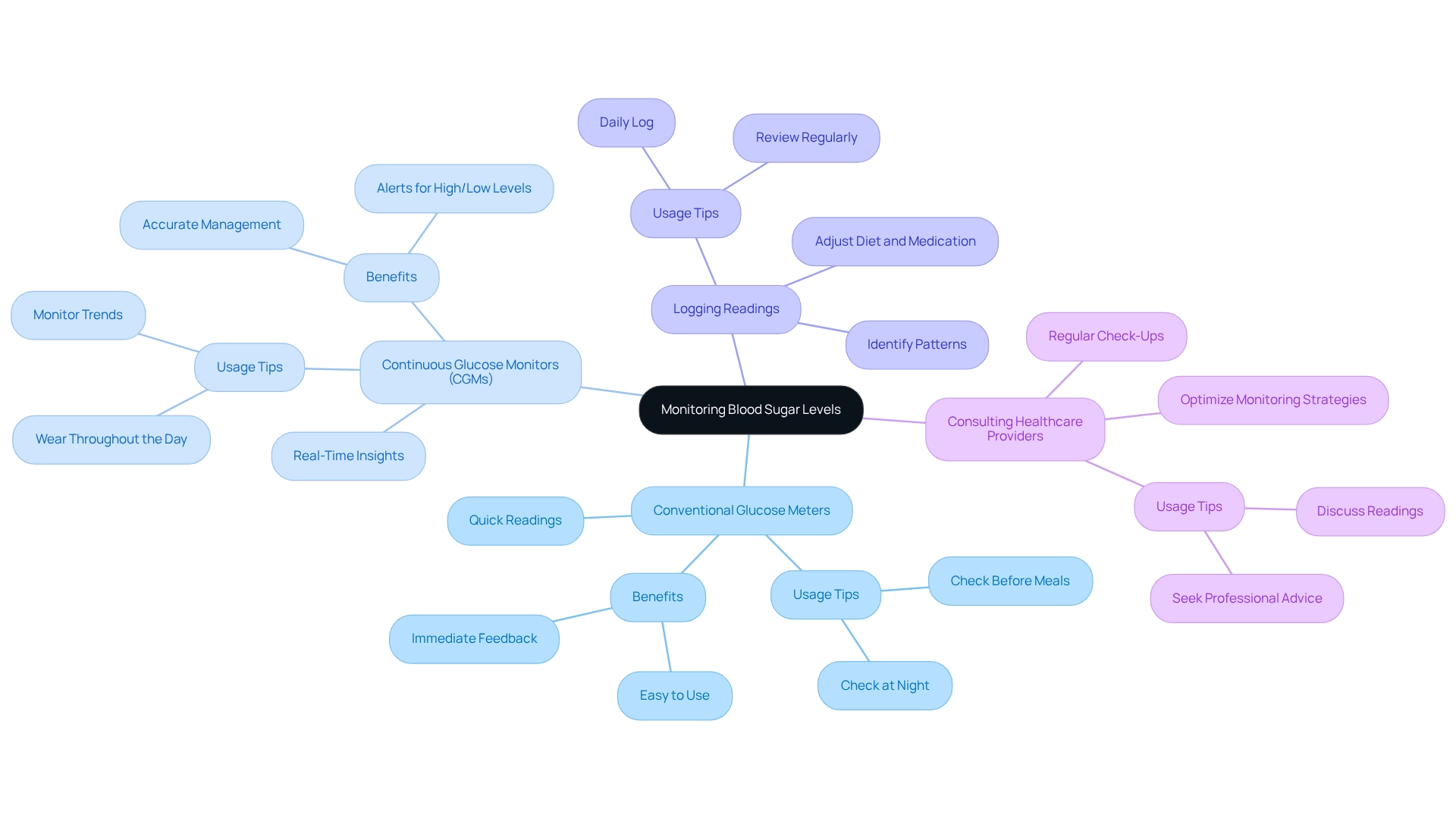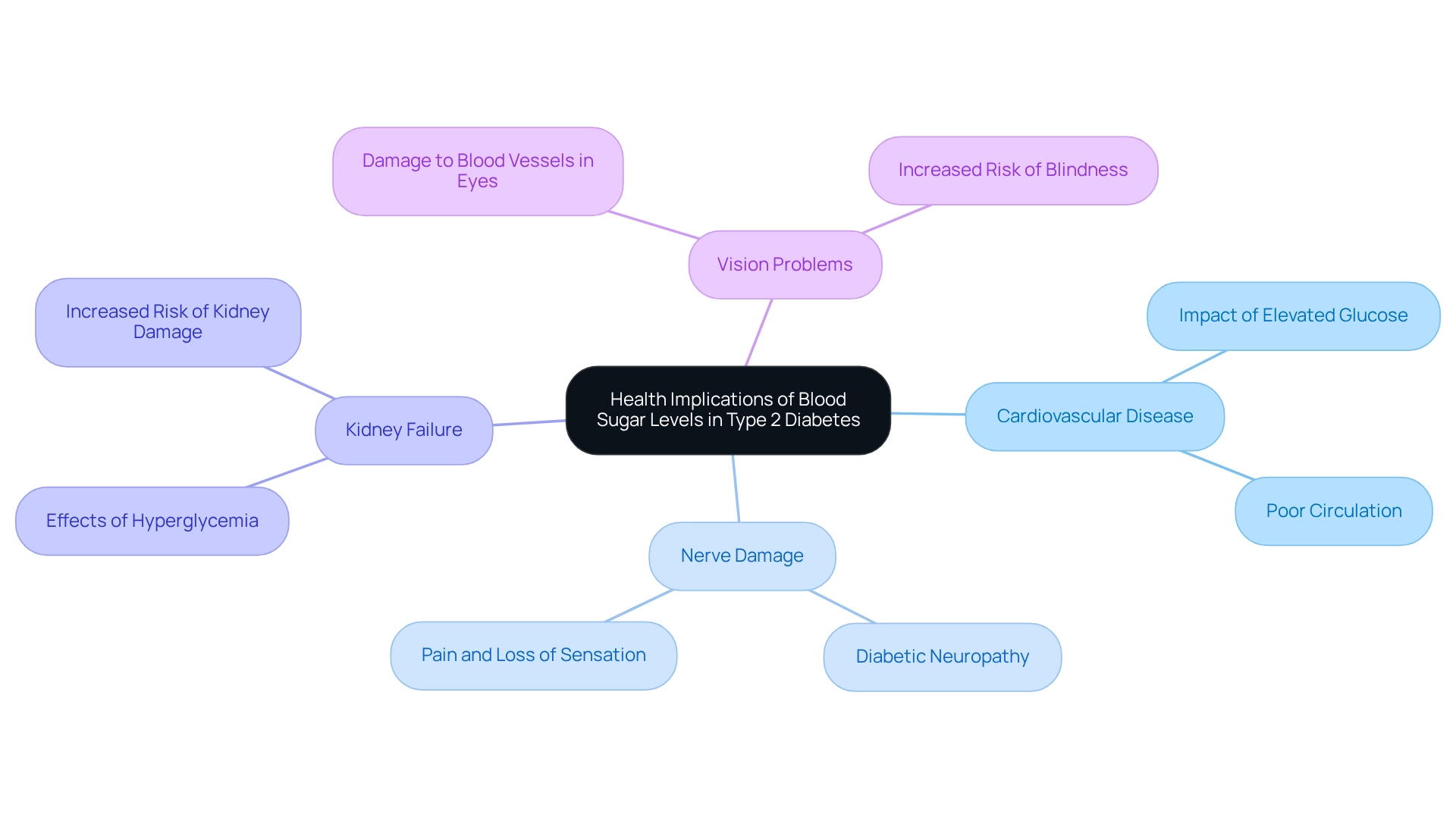Overview
Understanding blood sugar is crucial for managing Type 2 diabetes. It's important to maintain glucose levels within a specific range—70 to 130 mg/dL before meals and under 180 mg/dL after eating—to prevent serious health complications. This can feel overwhelming, but you're not alone in this journey. The article highlights the importance of:
- Insulin function
- Regular monitoring
- Lifestyle choices in regulating blood sugar
Proactive management can significantly reduce risks associated with elevated glucose levels, such as cardiovascular disease and nerve damage.
It's understandable to feel concerned about these numbers, but there are steps you can take. Regular monitoring and a focus on your lifestyle choices can make a difference. Remember, we are here to support you every step of the way. By taking these actions, you can empower yourself to manage your health effectively.
Introduction
Navigating the complexities of diabetes management can feel overwhelming, but understanding blood sugar and its critical role in your overall health is a vital first step. Blood sugar, or blood glucose, serves as your body’s primary energy source. However, keeping it within a target range is essential to prevent serious complications associated with diabetes.
For those with Type 2 diabetes, the interplay between food, exercise, and medication can significantly impact blood sugar levels. It’s understandable to feel uncertain about how these factors interact. That’s why education and self-management are so important. This article will explore the intricacies of blood sugar regulation, the function of insulin, and the tools available for monitoring your levels. We will also highlight the health implications of uncontrolled blood sugar.
Remember, you’re not alone in this journey. With resources and community support from T2DSolutions, you can empower yourself to take charge of your diabetes journey and enhance your quality of life. We are here to support you every step of the way.
Define Blood Sugar and Its Role in Diabetes Management
Glucose, often referred to as serum glucose, is the primary sweetener found in your bloodstream, serving as a vital energy source for your body's cells. It's important to maintain glucose concentrations within a specific range to prevent complications. For those navigating Type 2 conditions, understanding how nutrition, physical activity, and medications can affect blood sugar for diabetes type 2 is essential for effective self-management. Typically, glucose levels range from 70 to 130 mg/dL before meals and under 180 mg/dL after eating. Recognizing these values can empower you to make informed decisions about your diet and lifestyle.
At T2DSolutions, we understand that being recently diagnosed can feel overwhelming. We are here to provide you with the tools and support necessary to effectively manage your blood sugar for diabetes type 2. Our goal is to ensure you have access to the most current information and a community that stands by you as you navigate your health journey. Remember, you're not alone in this journey; we are here to support you every step of the way.

Explain Blood Sugar Regulation and Insulin Function
Managing blood glucose levels is a vital aspect of your health, and it primarily hinges on insulin, a hormone that your pancreas produces. When you eat, carbohydrates break down into glucose, which then enters your bloodstream. In response, your pancreas releases insulin, enabling your cells to absorb glucose for energy. However, in Type 2 diabetes, the body can develop resistance to insulin, leading to increased glucose concentrations.
Understanding this process is crucial, especially for those of you who are navigating the challenges of controlling blood sugar levels. It highlights the importance of insulin sensitivity and how your lifestyle choices can significantly improve insulin performance. Remember, you're not alone in this journey; many face similar challenges.
By consistently tracking your glucose measurements, you can make informed adjustments to your diet and activities, helping you maintain ideal glucose management. It's understandable to feel overwhelmed, but taking these steps can empower you to take control of your health. We are here to support you every step of the way.

Guide on Monitoring Blood Sugar Levels: Tools and Techniques
At T2DSolutions, we understand how important it is to have access to valuable resources for diabetes education and community support. Tracking your blood sugar for diabetes type 2 levels is a crucial part of managing your condition, and there are several tools available to help you.
- Conventional glucose meters require just a small sample from your fingertip, providing quick readings that can guide your daily decisions. We recommend checking your blood sugar for diabetes type 2 before meals and at night to stay informed about your health.
- On the other hand, continuous glucose monitors (CGMs) provide real-time insights into blood sugar for diabetes type 2 levels throughout the day. This technology can empower you to manage your blood sugar for diabetes type 2 more accurately and effectively.
- As you navigate these tools, it's essential to keep a log of your blood sugar for diabetes type 2 readings. This practice helps you identify patterns and make necessary adjustments to your diet and medication, which is crucial for managing blood sugar for diabetes type 2.
- Regular consultations with your healthcare provider are also vital in optimizing your monitoring strategies.
Remember, you're not alone in this journey. For additional details and support in managing your condition, we encourage you to connect with T2DSolutions. We are here to support you every step of the way.

Discuss the Health Implications of Blood Sugar Levels in Type 2 Diabetes
Unregulated blood sugar for diabetes type 2 can lead to serious health challenges for individuals, including:
- Cardiovascular disease
- Nerve damage
- Kidney failure
- Vision problems
It’s understandable to feel concerned about how elevated glucose levels can affect your health. These higher levels can damage blood vessels, resulting in poor circulation and an increased risk of heart disease.
Moreover, prolonged hyperglycemia can lead to diabetic neuropathy, impacting nerve function and potentially causing pain or loss of sensation. It’s crucial to recognize that frequent monitoring and control of blood sugar for diabetes type 2 are essential in reducing these risks. By maintaining blood sugar for diabetes type 2 within target ranges, you can significantly lower the likelihood of experiencing these complications and improve your overall quality of life.
At T2DSolutions, we are here to support you every step of the way. We provide valuable resources and community support to help you effectively manage your blood sugar for diabetes type 2. Our educational materials and tools are designed to empower you on your diabetes management journey. Remember, you're not alone in this journey; together, we can navigate the challenges and celebrate the victories.

Conclusion
Understanding blood sugar and its management is crucial for anyone navigating the complexities of Type 2 diabetes. Blood sugar serves as the primary energy source for the body, and it requires careful regulation through diet, exercise, and medication to prevent serious health complications. By recognizing the importance of maintaining blood sugar levels within target ranges, you can make informed decisions that significantly impact your health.
The role of insulin in blood sugar regulation cannot be overstated. As the hormone responsible for facilitating glucose absorption, insulin is vital for energy production. For those managing Type 2 diabetes, enhancing insulin sensitivity through lifestyle changes is essential. Regular monitoring of blood sugar levels—whether through traditional meters or continuous glucose monitors—empowers you to adjust your habits and maintain optimal control over your condition.
The consequences of uncontrolled blood sugar levels are severe, leading to complications such as cardiovascular disease, nerve damage, and kidney failure. By prioritizing blood sugar management, you can mitigate these risks and improve your quality of life. With the support and resources available from T2DSolutions, you can take proactive steps in your diabetes journey, ensuring you are equipped with the knowledge and community backing needed to thrive. Remember, empowerment through education and support is key to effectively managing diabetes and enhancing your overall well-being.
Frequently Asked Questions
What is glucose and why is it important?
Glucose, often referred to as serum glucose, is the primary sweetener found in the bloodstream and serves as a vital energy source for the body's cells.
What are the normal glucose level ranges for individuals with Type 2 diabetes?
Normal glucose levels typically range from 70 to 130 mg/dL before meals and under 180 mg/dL after eating.
Why is it important to maintain glucose concentrations within a specific range?
Maintaining glucose concentrations within a specific range is essential to prevent complications related to diabetes.
How can nutrition, physical activity, and medications affect blood sugar levels for those with Type 2 diabetes?
Understanding how nutrition, physical activity, and medications influence blood sugar levels is crucial for effective self-management of Type 2 diabetes.
What support does T2DSolutions offer for managing blood sugar in Type 2 diabetes?
T2DSolutions provides tools and support to help individuals effectively manage their blood sugar, along with access to current information and a supportive community.



